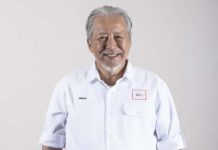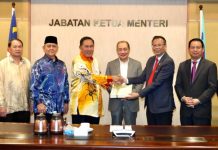KOTA KINABALU: In 2021, Malaysia dropped five spots in the Transparency International Corruption Perception Index (CPI) to 62 nd position out of 180 countries in terms of public sector corruption. In 2020, the country ranked 57, while in 2019 it was placed at 51. Malaysia scored 48 out of 100 points in the index in 2021, compared to its 2020 score of 51.
The CPI ranks 180 countries and territories around the world by their perceived levels of public sector corruption. The results are given on a scale of 0 (highly corrupt) to 100 (very clean).
At a time when Malaysia continues its slippery slide down the corruption rankings, on 18 February 2022, the former Sabah Water Department deputy director was ordered to pay RM30 million as punishment where he was charged on 13 December 2017 with 146 counts of charges for money laundering involving RM32 million.
It was reported that the order was accompanied by a discharge not amounting to an acquittal from the Sessions Court judge after being informed that the prosecuting team led by the Malaysian Anti- Corruption Commission (MACC) opted not to proceed with the case.
The Sabah Law Society (SLS) is aware of the provisions under Section 92 of the Anti-Money
Laundering, Anti-Terrorism Financing and Proceeds of Unlawful Activities Act 2001 (AMLA) which stipulates:
92. (1) The competent authority or relevant enforcement agency, as the case may be, may,
with the consent of the Public Prosecutor, compound any offence under this Act or under
regulations made under this Act, by accepting from the person reasonably suspected of
having committed the offence such amount not exceeding fifty per centum of the amount of the maximum fine for that offence, including the daily fine, if any, in the case of a continuing offence, to which that person would have been liable if he had been convicted of the offence, within such time as may be specified in its written offer.
It was further reported that the MACC legal and prosecution division senior director, speaking to reporters after the proceedings, had said that the compound is a form of punitive action and enables asset recovery of the lost funds. However, this justification must be seen in the following light as summarised from available press reports:
More than 200 witnesses were reported to give their statements to MACC.
The former Sabah Water Department deputy director was charged on 13 December 2017. The trial was supposed to resume on 2–3 April 2018 but was postponed to 7–11 May 2018.
In March 2018, the former Sabah Water Department deputy director's application to quash all 146 corruption charges made against him was dismissed by the High Court.
On 21 May 2018, the Sessions Court postponed the trial following the former Sabah Water Department deputy director's application for a stay having been granted by the Court of Appeal in Putrajaya on 18 May 2018 until the disposal of three appeals.
The former Sabah Water Department deputy director appeal had appealed against two
forfeiture orders in the High Court as regards to the lands and bank accounts of the former
Sabah Water Department deputy director and the refusal of the High Court to revise the
Sessions Court’s order against the recusal of the Sessions Court Judge for the trial; against the refusal of the High Court to revise the Sessions Court’s order for a joint trial of all four accused; and against the refusal of the High Court to set aside all 146 charges on grounds of mala fide.
On 19 March 2019, the Sessions Court has set trial dates to commence 6 August 2019 for the continuation of the trial. As of that date, the prosecution had so far called five witnesses in the trial.
The Malaysian Bar had on the occasion of the Opening of the Legal year 2022 said that it would bode well for the Attorney General's Chambers (AGC) to provide reasons to the public when it decides to discontinue prosecution at any stage in cases of public interest, regardless of the personality.
Notwithstanding that the Federal Constitution under article 145(3) empowers the Attorney General with ‘wide discretion’; to conduct, institute or discontinue any proceedings for a criminal offence, this discretion is not absolute and unfettered.
SLS wholeheartedly endorses this clarion call and further says that this principle should likewise apply to all competent authority or relevant enforcement agency prosecuting public interest cases. It is a central tenet of the rule of law that there must be transparency in any decision making which is crucial to build public trust and confidence.
In cases attracting high public interest where the charge is one that strikes in the heart of faith in the administration and its governance, the AGC and/or competent authorities or relevant enforcement agencies including MACC must provide reasons to the public where it decides to discontinue to prosecute at any stage, even more so when the very integrity of the institution making that decision itself is in the spotlight and under scrutiny due to a stock trading incident. Section 92 of AMLA clearly provide that the competent authority or relevant enforcement agency, as the case may be, may, with the consent of the Public Prosecutor are to make the decision whether to compound or not a charge – either the AGC and/or MACC is obliged to explain to the public the reasons for the decision to not proceed with the charges. A lack of information only fuels speculation amongst the public and continue to encourage international perception of rampant corruption in Malaysia.
As Malaysia fights to save its soul from the plague of corruption, competent authorities or relevant enforcement agencies must explain to the public how a person is charged for misappropriation involving RM32 million can obtain a discharge by paying a RM30 million compound and face no further consequences especially when the very availability of RM30 million to pay the compound itself lies at the very heart of the charges faced. If a good reason exists, transparency demands that this should be at the very least indicated to the public. Long gone are the days of a “father knows best” and “do as I say” without the need to give an explanation.-
Roger Chin
President
Sabah Law Society
20 February 2022






